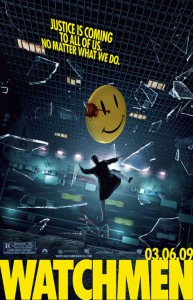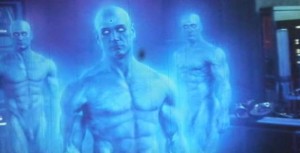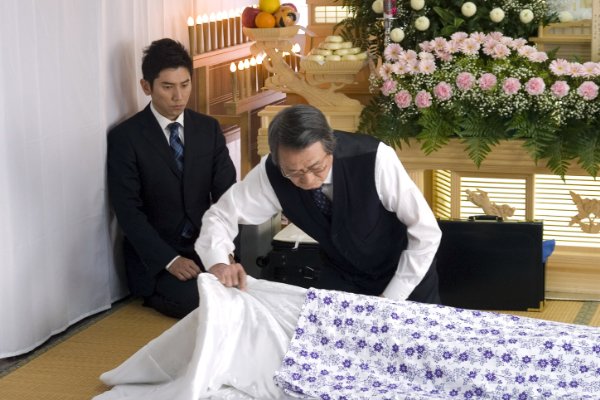 There’s a growing consensus that Zack Snyder’s movie adaptation of Watchmen is faithful to a fault, but it’s closer to say that the movie is faulty to the faithful. Alan Moore and Dave Gibbons’ magisterial graphic novel poses a catch-22 to any would-be adapters: the nearer one hews to the source material, the farther one gets from matching its radical, far-reaching influences. We live in a post-Watchmen world, where cinema and the superhero genre have adopted so many of Moore’s originalities as their own that an adaptation that merely animates the novel’s plot and visuals at 24 frames per second will contribute nothing, save for an end to that pent-up potential with which the idea of a Watchmen movie has been ever anticipated. To that end, Snyder’s Watchmen is the definitive Hollywood adaptation, hell-bent on destroying all that Moore’s novel had stood for, while amping up its own lurid pleasures—and (fan)boy, does it succeed.
There’s a growing consensus that Zack Snyder’s movie adaptation of Watchmen is faithful to a fault, but it’s closer to say that the movie is faulty to the faithful. Alan Moore and Dave Gibbons’ magisterial graphic novel poses a catch-22 to any would-be adapters: the nearer one hews to the source material, the farther one gets from matching its radical, far-reaching influences. We live in a post-Watchmen world, where cinema and the superhero genre have adopted so many of Moore’s originalities as their own that an adaptation that merely animates the novel’s plot and visuals at 24 frames per second will contribute nothing, save for an end to that pent-up potential with which the idea of a Watchmen movie has been ever anticipated. To that end, Snyder’s Watchmen is the definitive Hollywood adaptation, hell-bent on destroying all that Moore’s novel had stood for, while amping up its own lurid pleasures—and (fan)boy, does it succeed.
Let us dispense first with the myth of Snyder’s “faithfulness”. His slavish reproduction of the novel’s images is nearly as flattering to Moore and Gibbons as the Tijuana bible of herself that a retired Wonder Woman-type keeps as a memento in Watchmen: it might be nice to be paid tribute to, but not when the alleged tribute simply reduces you to a fanboy’s wank material. Audiences who think that this is somehow a “straight” or “literal” adaptation of the novel aren’t paying enough attention. In the novel, while waiting in a food line, the sociopath Rorschach defends himself by scalding his attacker’s face with a nearby pan of hot frying fat. In this movie, Rorschach has already taken down the attacker with his bare fists before he proceeds to smash a now-existent glass between him and the pan, hurling its contents into the felled man’s face. This is more work for Rorschach than before, not less, so the change is not some attempt to pare the novel down to movie length. It is a celebration of excess:
Violence. A brief physical combat in the novel, meant to counterpoint the emotional torture of another character, is made into its own extended point. Another fight is added for its own sake. Both are accompanied by blazing guitars.
Gore. An exceptional scene, not from the book, has Rorschach cornering an archrival in a bathroom. We’re left outside looking in, and the swinging door slices up our viewing rhythm; we catch only glimpses of Rorschach as he edges closer, closer to his prey. Cut away, the sound of a toilet flushing, and Rorschach steps into frame and out of the scene. Remarkable restraint on Snyder’s part, but the word I chose was “exceptional”, and not even then: the scene doesn’t end there, and the camera pans back to the bathroom door, so we can watch blood spill out from under it. (Duh.) As for the rest of the movie: head-cleaving, hand-severing, elbow-snapping—Snyder’s here to give, give, give.
Sex. Snyder scores “Hallelujah” to a prolonged sex scene between two Watchmen in an airship, which ejaculates fire across the night sky. It’s an emotional climax in the novel, but Snyder plays it for laughs even in the midst of making it more explicit, perhaps because that’s the only way he can defuse his own discomfort at such frankness.
 Nudity. Granted, Dr Manhattan’s nudity is famous in comics, but the whole point was that he’s become so unbound by human norms that he’s nonchalant about it. Yet in the movie, Dr Manhattan’s penis is jarring, especially since Snyder doesn’t know how to handle it in any way other than as a visual punchline. He doesn’t reveal it often enough for us to get desensitized to it, so that whenever he cuts to a longer shot than usual—bam!—the eye gets distracted.
Nudity. Granted, Dr Manhattan’s nudity is famous in comics, but the whole point was that he’s become so unbound by human norms that he’s nonchalant about it. Yet in the movie, Dr Manhattan’s penis is jarring, especially since Snyder doesn’t know how to handle it in any way other than as a visual punchline. He doesn’t reveal it often enough for us to get desensitized to it, so that whenever he cuts to a longer shot than usual—bam!—the eye gets distracted.
It doesn’t help that the penis in question seems bigger than it should be from the novels, which leads us to the question—given that Dr Manhattan is a god-figure in the movie—whether Snyder was being subconsciously meta.
Explosions. ‘Nuff said.
Pop music. Snyder shoehorns in the swelling trumpets of Wagner’s “Flight of the Valkyries” over Dr Manhattan as he looms in over the sunset, disintegrating Vietcong troops in the foreground with a jab of his hand; and the strains of Jimi Hendrix’s “All Along The Watchtower” as two Watchmen navigate their airship into Antarctica, never mind the redundancy of scoring the lyrics “two riders were approaching, the wind began to howl” over a scene that shows us precisely that. The point of all this overscoring is to provide “oooh!” moments for fans who recall that Moore alluded to these songs in the book—a sort of pleasure that comes from being in on the joke.
Structurally, this is similar to the approach taken in the Harry Potter movies, another pop culture franchise with a hard-to-compress mythology. The result, too, is similar: Watchmen often feels snippy and episodic (made worse because the half-duplicated serial chapter structure focuses on each major character in turn) in its bid to retain the high points, the killer lines and classic images. When Snyder slow-mos a frame that’s the visual equivalent of yet another comic panel, then, he isn’t doing it out of some misbegotten sense of fidelity to Moore’s “vision”.
He’s doing it because it’s a money shot.
Want to rent the fantastic Watchmen or even watch it online? Visit LOVEFiLM, the home of movies on demand. Watchmen has been rated as one of the top superhero movies of the last decade. See what the all the hype is about for yourself. Visit LOVEFiLM today.
Watchmen | 2009 | USA | Director: Zack Snyder | Screenplay: David Hayter, Alex Tse | Cast: Malin Akerman, Billy Crudup, Matthew Goode, Jackie Earle Haley, Jeffrey Dean Morgan, Patrick Wilson, Carla Gugino


 There’s a growing consensus that Zack Snyder’s movie adaptation of Watchmen is faithful to a fault, but it’s closer to say that the movie is faulty to the faithful. Alan Moore and Dave Gibbons’ magisterial graphic novel poses a catch-22 to any would-be adapters: the nearer one hews to the source material, the farther one gets from matching its radical, far-reaching influences. We live in a post-Watchmen world, where cinema and the superhero genre have adopted so many of Moore’s originalities as their own that an adaptation that merely animates the novel’s plot and visuals at 24 frames per second will contribute nothing, save for an end to that pent-up potential with which the idea of a Watchmen movie has been ever anticipated. To that end, Snyder’s Watchmen is the definitive Hollywood adaptation, hell-bent on destroying all that Moore’s novel had stood for, while amping up its own lurid pleasures—and (fan)boy, does it succeed.
There’s a growing consensus that Zack Snyder’s movie adaptation of Watchmen is faithful to a fault, but it’s closer to say that the movie is faulty to the faithful. Alan Moore and Dave Gibbons’ magisterial graphic novel poses a catch-22 to any would-be adapters: the nearer one hews to the source material, the farther one gets from matching its radical, far-reaching influences. We live in a post-Watchmen world, where cinema and the superhero genre have adopted so many of Moore’s originalities as their own that an adaptation that merely animates the novel’s plot and visuals at 24 frames per second will contribute nothing, save for an end to that pent-up potential with which the idea of a Watchmen movie has been ever anticipated. To that end, Snyder’s Watchmen is the definitive Hollywood adaptation, hell-bent on destroying all that Moore’s novel had stood for, while amping up its own lurid pleasures—and (fan)boy, does it succeed. Nudity. Granted, Dr Manhattan’s nudity is famous in comics, but the whole point was that he’s become so unbound by human norms that he’s nonchalant about it. Yet in the movie, Dr Manhattan’s penis is jarring, especially since Snyder doesn’t know how to handle it in any way other than as a visual punchline. He doesn’t reveal it often enough for us to get desensitized to it, so that whenever he cuts to a longer shot than usual—bam!—the eye gets distracted.
Nudity. Granted, Dr Manhattan’s nudity is famous in comics, but the whole point was that he’s become so unbound by human norms that he’s nonchalant about it. Yet in the movie, Dr Manhattan’s penis is jarring, especially since Snyder doesn’t know how to handle it in any way other than as a visual punchline. He doesn’t reveal it often enough for us to get desensitized to it, so that whenever he cuts to a longer shot than usual—bam!—the eye gets distracted.